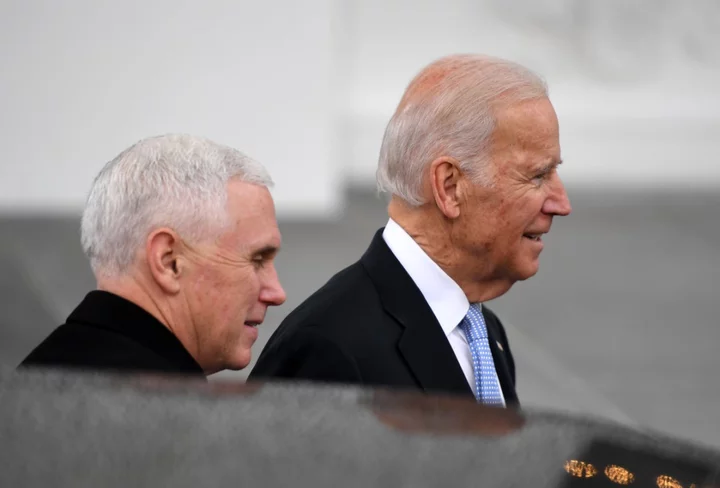
Biden and Pence were also caught with classified documents. Why is Trump’s case different?
Donald Trump’s supporters and many Republican officials contend that the former president is the target of a politically weaponised justice system that has ignored similar alleged crimes committed by his rivals. “Lock her up” chants directed at Hillary Clinton still dominate GOP rallies. House Republicans have launched committees to investigate the sitting president and his family. But in classified documents cases involving President Joe Biden and former vice president Mike Pence, both men cooperated with federal law enforcement and returned those records. Ms Clinton was not found to have deliberately mishandled classified information or obstruct justice in the recovery of communications. Mr Trump, according to prosecutors, did exactly that. A federal indictment details the alleged coordination among Mr Trump, his aides and attorneys to bring documents to his Mar-a-Lago property and, later, conceal them from law enforcement when US officials sought their return. His alleged refusal and obstruction is at the centre of the 37-count indictment against him. The indictment lays out more than 40 pages of allegations based on witness testimony and recordings allegedly showing how the former president sought to hide and keep classified documents by conspiring with his aides to obstruct an investigation into their recovery, then lied to both the government and his own attorneys about them. He faces 31 counts of willful retention of national defence information in violation of the Espionage Act, carrying a maximum prison sentence of 10 years. Each count represents a different top-secret document Mr Trump held at his Mar-a-Lago property, months after he left the White House in January 2021. The indictment does not include charges connected to dozens of other documents that he ultimately did return in the course of investigations surrounding the case – underscoring some of the key differences between his prosecution and those involving the former vice presidents. Late last year, a lawyer for Mr Biden discovered a “small number” of classified documents from his time as vice president under then-President Barack Obama during a search of a Washington DC office space. Those documents were returned to the Justice Department. Another batch of documents were discovered at his home in Wilmington, Delaware. Federal law enforcement agents found more when they searched the property. In January, US Attorney General Merrick Garland named a special counsel to investigate those documents, which is still ongoing. No charges have been filed. The Justice Department also closed an investigation into Mr Pence earlier this month after the discovery of classified material at his home in Indiana. There were no allegations of obstruction or the willful retention of such documents, and no charges were brought against him. And in Ms Clinton’s case, then-FBI director James Comey said she was “extremely careless” with her handling of sensitive information, but law enforcement officials found no clear evidence that she intentionally obstructed justice or committed any other crimes in connection with the server. He said “no reasonable prosecutor” would have brought a case against her. Those findings stand in stark contrast to the allegations in the indictment against Mr Trump, who is accused of actively concealing documents and even suggesting that a lawyer hide them or falsely state to authorities that all requested records were returned, while hundreds remained at his property. None of the nearly 200 documents that Mr Trump ultimately returned to authorities are connected to the charges against him, suggesting that if he had returned them in the first place, he may not face criminal prosecution. In January of last year, a year after leaving the White House after losing his 2020 re-election bid, Mr Trump gave 15 boxes of documents to the National Archives and Records Administration, as required under the Presidential Records Act. The agency wrote to Mr Trump in May 2021 noting that some documents were missing, noting that there are “certain paper/textual records that we cannot account for.” Around that same time, according to the indictment, Mr Trump directed aides to clear a storage room on the ground floor of Mar-a-Lago. More than 80 boxes were moved there, according to prosecutors. A few months later, he allegedly showed a “plan of attack” document prepared by the US Department of Defense to a group at his Bedminster, New Jersey club. “As president I could have declassified it,” he said, according to a transcript of a recorded conversation in the indictment. “Now I can’t, you know, but this is still a secret.” The National Archives received 15 boxes from Mr Trump in January 2022, 14 of which contained classified materials, according to prosecutors. Among them, 67 were marked “confidential,” 92 were marked “secret” and 25 were marked “top secret.” The next month, the agency alerted the US Department of Justice that classified information was discovered in those boxes. It was then that a criminal investigation surrounding the former president started to build – not from the results of the National Archives and its ultimately successful recovery of 15 boxes. A federal grand jury was opened in April of last year. In the weeks and months that followed, Mr Trump’s aide Walt Nauta began moving more than a dozen boxes out of the storage room, according to the indictment. Mr Nauta also is charged in connection with the case. On 3 June of last year, Mr Trump’s then-attorney Christina Bobb falsely certified to federal law enforcement that the former president’s legal team performed a “diligent search” for “any and all responsive documents” at his property, and that no other classified documents were found, according to prosecutors. The Justice Department received 38 documents in that file, including 17 marked “top secret,” 16 labeled “secret” and five others marked as confidential. Meanwhile, Mr Nauta and others loaded several boxes onto a plane that Mr Trump boarded out of his Florida home, according to the indictment. In August, FBI agents performed a search of Mar-a-Lago and discovered more than 100 classified documents among hundreds of government documents and photographs. In the documents outlined in the indictment, at least two of which involved nuclear secrets according to an inventory listed in the indictment, 21 were discovered by FBI agents who searched Mar-a-Lago. Ten others were turned over to federal authorities last June in response to a grand jury subpoena. Others involved intelligence briefings, foreign military activity, communication with foreign leaders, foreign military impacts on US interests, and communications with a foreign leader. According to prosecutors, Mr Trump conspired to conceal documents from a grand jury and federal officials, by suggesting that his attorneys make false statements to authorities, by moving boxes of documents to hide from attorneys, by suggesting that documents be hidden or destroyed, and by falsely certifying that classified documents were produced to authorities “when, in fact, they had not.” Prosecutors are expected to present compelling evidence that the former president knowingly and deliberately misled his attorneys about his retention of sensitive documents He also appears, on a tape, six months after leaving office, saying that a document in his possession was “classified”, “highly confidential” and “secret information” while admitting that he was not able to declassify it, because he was no longer president – undercutting a critical part of his public defence over the last several months. Read More Trump indictment - news: Trump vows revenge as he lands in Miami for arraignment on 37 federal charges Trump, Biden, Pence - who else? Inside the presidential scramble to check for classified documents How Trump’s second indictment unfolded: A timeline of the investigation into Mar-a-Lago documents ‘This is war’: Police monitoring online far-right threats and pro-Trump protests with federal indictment Handcuffs, fingerprints or a mugshot? What to expect as Trump faces arraignment in federal court Aileen Cannon: The judge with Trump’s fate in her hands was appointed by him
2023-06-13 07:19
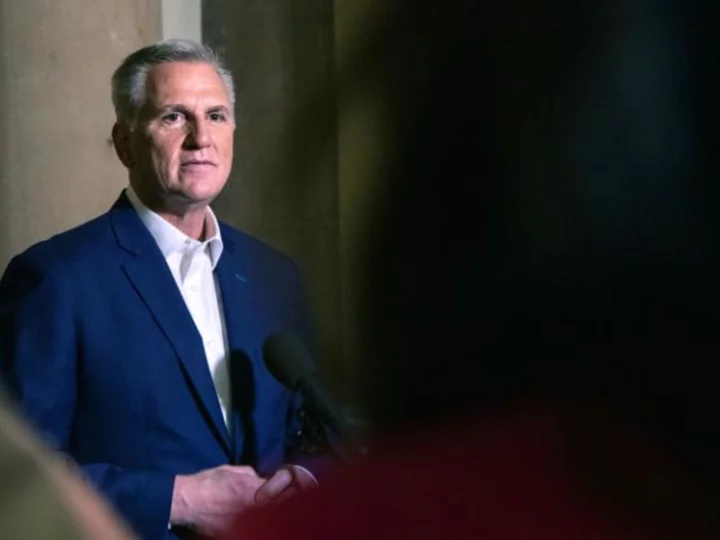
McCarthy and hardliners reach tentative agreement to resume House floor business
Hardline conservatives have agreed to end their blockade of the House floor while they continue discussions with House Speaker Kevin McCarthy about future spending decisions and a new "power-sharing agreement," according to multiple members leaving the speaker's office.
2023-06-13 06:57

US intelligence agencies buy Americans' personal data, new report says
The vast amount of personal data for sale online is an "increasingly powerful" tool for intelligence gathering by US and foreign spying agencies but also represents a privacy risk to ordinary people, according to a newly declassified US intelligence report.
2023-06-13 06:51

Cyberattack is a factor in Illinois hospital's closure
A hospital in Illinois will close on Friday due in part to a cyberattack -- a rare case of a health care provider publicly linking a hack incident to its closure.
2023-06-13 06:19
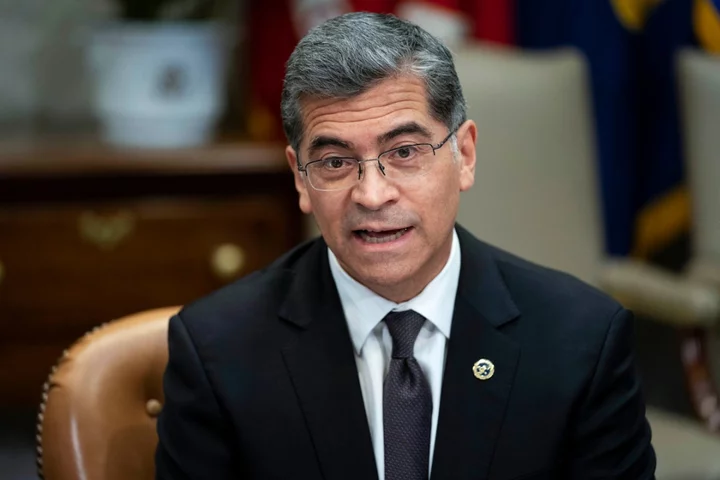
Biden administration urges states to slow down on dropping people from Medicaid
The Biden administration on Monday urged states to slow down their purge of Medicaid rolls, citing concerns that large numbers of lower-income people are losing health care coverage due to administrative reasons. The nation's Medicaid rolls swelled during the coronavirus pandemic as states were prohibited from ending people's coverage. But that came to a halt in April, and states now must re-evaluate recipients' eligibility — just as they had been regularly required to do before the pandemic. In some states, about half of those whose Medicaid renewal cases were decided in April or May have lost their coverage, according to data submitted to the Centers for Medicare & Medicaid Services and obtained by The Associated Press. The primary cause is what CMS describes as “procedural reasons,” such as the failure to return forms. “I am deeply concerned with the number of people unnecessarily losing coverage, especially those who appear to have lost coverage for avoidable reasons that State Medicaid offices have the power to prevent or mitigate,” Health and Human Services Secretary Secretary Xavier Becerra wrote in a letter Monday to governors. Instead of immediately dropping people who haven't responded by a deadline, federal officials are encouraging state Medicaid agencies to delay procedural terminations for one month while conducting additional targeted outreach to Medicaid recipients. Among other things, they're also encouraging states to allow providers of managed health care plans to help people submit Medicaid renewal forms. Nobody "should lose coverage simply because they changed addresses, didn’t receive a form, or didn’t have enough information about the renewal process,” Becerra said in a statement. States are moving at different paces to conduct Medicaid eligibility determinations. Some haven't dropped anyone from their rolls yet while others already have removed tens of thousands of people. Among 18 states that reported preliminary data to CMS, about 45% of those whose renewals were due in April kept their Medicaid coverage, about 31% lost coverage and about 24% were still being processed. Of those that lost coverage, 4-out-of-5 were for procedural reasons, according to the U.S. Department of Health and Human Services. In Arkansas, Florida, Idaho and Oklahoma, about half or more of those whose eligibility cases were completed in April or May lost their Medicaid coverage, according data reviewed by the AP. Those figures may appear high because some states frontloaded the process, starting with people already deemed unlikely to remain eligible. CMS officials have specifically highlighted concerns about Arkansas, which has dropped well over 100,000 Medicaid recipients, mostly for not returning renewal forms or requested information. Arkansas officials said they are following a timeline under a 2021 law that requires the state to complete its redeterminations within six months of the end of the public health emergency. They said Medicaid recipients receive multiple notices — as well as texts, emails and phone calls, when possible — before being dropped. Some people probably don't respond because they know they are no longer eligible, the state Department of Human Services said. Republican Gov. Sarah Huckabee Sanders has dismissed criticism of the state’s redetermination process, saying Arkansas is merely getting the program back to its pre-pandemic coverage intentions. But health care advocates said it's particularly concerning when states have large numbers of people removed from Medicaid for not responding to re-enrollment notices. "People who are procedurally disenrolled often are not going to realize they’ve lost coverage until they show up for a medical appointment or they go to fill their prescription and are told you no longer have insurance coverage,” said Allie Gardner, a senior research associate at the Georgetown University Center for Children and Families. __ Associated Press writer Andrew DeMillo contributed from Little Rock, Arkansas. Read More Ukraine war’s heaviest fight rages in east - follow live Charity boss speaks out over ‘traumatic’ encounter with royal aide Speaker McCarthy eyes new commission to tackle nation's debt, but many Democrats are wary Connecticut to adjourn largely bipartisan session in contrast to rancor in other states Missouri governor signs ban on transgender health care, school sports
2023-06-13 04:53
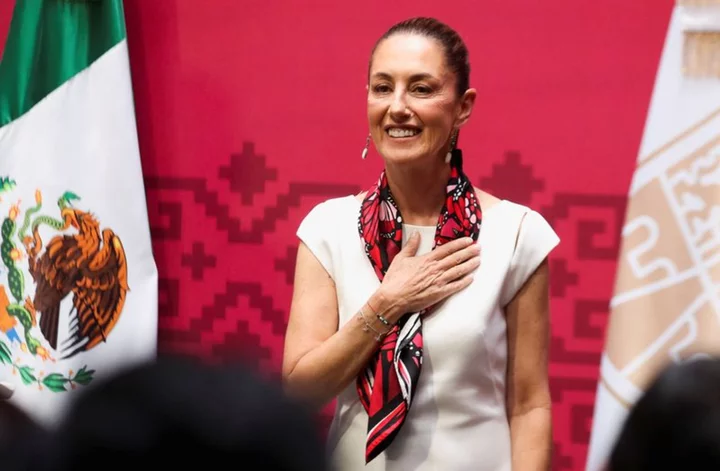
Mexico City mayor to step down to pursue historic bid for presidency
MEXICO CITY Mexico City Mayor Claudia Sheinbaum said on Monday she will step down this Friday to seek
2023-06-13 04:26
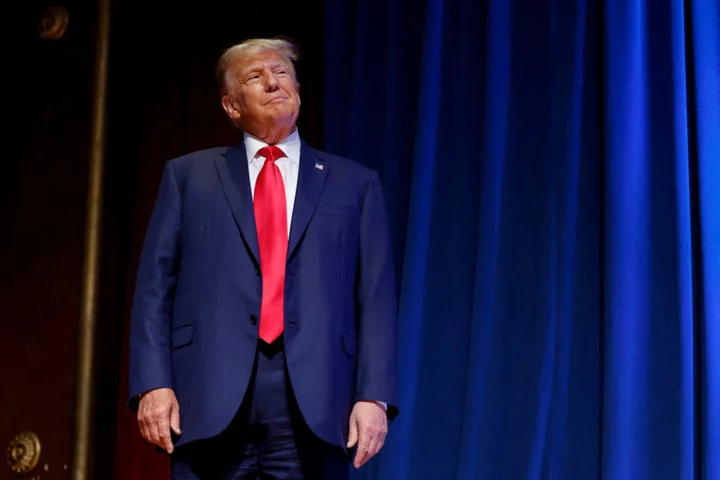
Handcuffs, fingerprints or a mugshot? What to expect as Trump faces arraignment in federal court
After a grand jury recommended criminal charges against Donald Trump, federal prosecutors issued a sweeping 37-count indictment charging the former president with obstruction and the unlawful retention of national defense information for allegedly storing dozens of sensitive government documents at his Florida home and refusing to turn them over to federal authorities. The former president’s second indictment follows criminal charges in Manhattan earlier this year for allegedly falsifying business records to conceal hush-money payments in an effort to kill stories about his alleged affairs during the 2016 presidential election. Mr Trump turned himself into authorities in New York City on 4 April and sat for a brief arraignment hearing in criminal district court before returning to his Mar-a-Lago home to deliver a speech to supporters. Law enforcement agencies are now preparing for his arrival in Miami, where he will make a first appearance in federal court to formally hear the charges against him in his first-ever federal case. The case – stemming from the US Department of Justice special counsel investigation into classified documents, and whether he intentionally obstructed the government’s efforts to return them – is separate from the Justice Department’s probe into Mr Trump’s role in the events surrounding January 6 and a Georgia prosecutor’s investigation into his attempts to subvert the outcome of the 2020 election in that state. Here, we explain what the day could look like: Where and when is Trump going to court? There are 94 district courts around the US, and generally a defendant will be tried in the district where the crimes are alleged to have been committed. Mr Trump will travel to a federal court in the Southern District of Florida, the jurisdiction for his Mar-a-Lago property. Mr Trump flew by private plane from his Trump National Golf Club Bedminster in New Jersey on 12 June. He will stay overnight at his Trump National Doral resort in Miami before his makes his appearance at the federal courthouse, roughly 12 miles from the hotel. His arraignment at the Wilkie D Ferguson Jr United States Courthouse in Miami is scheduled for 3pm ET on 13 June. Will Trump be handcuffed? Probably not. He will surrender to the authorities, go through processing, and then enter the courtroom for his first appearance before the judge. It is unlikely that he will be in handcuffs for any part of that process. What about a mugshot? That is also unlikely. US Secret Service officers will guide Mr Trump to the courthouse, where US Marshals and probation officers will begin pretrial services, including electronic fingerprinting and formal booking. What will happen during the hearing? Mr Trump will be formally presented with the charges against him and be informed of his rights. He may also enter a plea; he is expected to plead “not guilty” based on the months-long claims that the investigations against him are a politically motivated “hoax” and a “witch hunt.” And what happens after? There is a theoretical possibility that Mr Trump will remain in custody after his arraignment, but it is highly unlikely a judge would order this, and he is not considered a flight risk. He was released on his own recognizance following his arraignment in a Manhattan criminal court in April. The former president is scheduled to return to his Bedminster club to deliver remarks before a fundraising event. He similarly returned to his Mar-a-Lago property hours after he appeared in Manhattan criminal court in April, where he lambasted District Attorney Alvin Bragg and the judge overseeing the case, as well as the judge’s family members. Who is on Trump’s legal team? Following news of the indictment, two lawyers who represented Mr Trump in the months leading up to the charges resigned from his legal team over his handling of classified documents quit working for him on Friday morning. The attorneys, Jim Trusty and John Rowley, issued a joint statement stating that it was the “logical moment for us to step aside” and let other attorneys handle the case. Neither attorney wil represent Mr Trump in the other federal investigation stemming from Mr Trump’s alleged interference in Georgia. Todd Blanche, who represented Mr Trump in his Manhattan criminal case, will accompany Mr Trump in his federal case; a notice from Judge Cannon reminded him and others involved with the case that they are not members of the Southern District of Florida Bar. Another attorney, Christopher Kise, who is licenced in Florida, also is expected to accompany Mr Trump. Who is the judge? US District Judge Aileen Cannon – who was appointed by the former president in 2020 and previously ruled in his legal team’s favour in a series of court decisions surrounding the investigation – will handle the case. Last year, she appointed a “special master” to review materials seized by federal law enforcement and restricted the FBI from using those documents as part of the investigation until she completed a review, effectively freezing the US Department of Justice probe. That order was ultimately thrown out entirely by a federal appeals court, which roundly criticised her decision. If she does not recuse herself from the case and she remains a trial judge, she could play a potentially critical role in the case’s development, from setting a trial date to overseeing jury selection, the admission of certain evidence, and sentencing, if there is a conviction. Magistrate Judge John Goodman will oversee Mr Trump’s arraignment. The judge then will have the option to remand Mr Trump on bail or release him on his own recognizance before adjourning for a future date. Will there be a trial? Following a plea, the federal judge will adjourn the case and allow attorneys an opportunity to review the indictment and make motions regarding the case. It is expected that Mr Trump’s legal team will want the case dismissed. The district is known as a “rocket docket” court, where judges adhere to a speedy trial schedule that processes case to trial within 70 days. Special counsel Jack Smith also said prosecutors will push for a speedy trial “consistent with the public interest and the rights of the accused,” he said during brief public remarks announcing the indictment. “It’s very important for me to note that the defendants in this case must be presumed innocent until proven guilty, beyond a reasonable doubt in a court of law,” he said. How will this impact his presidential campaign? Mr Trump remains the frontrunner for the 2024 Republican nomination for president, and he has insisted that he will remain in the race regardless of any outcome in the criminal cases against hime. He has relied on the investigations and indictments to raise money for his campaign, which netted millions of dollars in the days after his charges were announced in his New York case. But the timeframe for the federal investigation – and, potentially, other pending cases that could result in criminal charges this year – could complicate his campaign ambitions. A first debate among Republican candidates is set for 23 August. A trial for the New York attorney general lawsuit targeting Mr Trump, his adult children and his business is slated to begin in October. And he is scheduled to return to Manhattan Criminal Court on 25 March – days after voting begins in primary states. Read More Trump indictment – live: Trump leaves Bedminster ahead of Miami arraignment as Bill Barr calls him ‘toast’ How Trump’s second indictment unfolded: A timeline of the investigation into Mar-a-Lago documents What a Florida grand jury and judge means for Trump’s indictment ‘This is war’: Police monitoring online far-right threats and pro-Trump protests with federal indictment Conspiracy, false statements and retaining national defence documents: The federal charges against Trump Jack Smith defends Trump indictment: ‘We have one set of laws and they apply to everyone’
2023-06-13 03:57
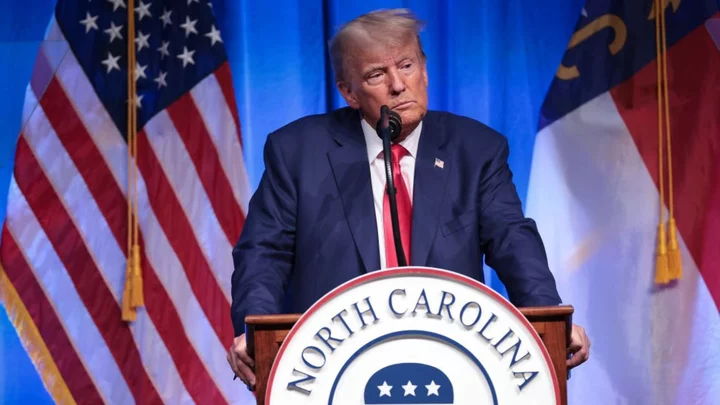
Here's how Trump's historic day in court will unfold
Donald Trump is scheduled to arrive at a federal courthouse in Miami amid tight security on Tuesday.
2023-06-13 03:00
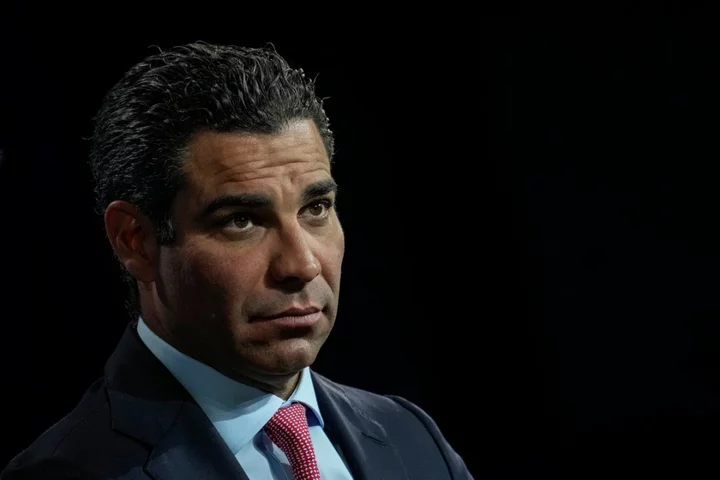
Miami mayor says city braced for protests ahead of Trump court appearance amid far-right threats
Miami mayor Francis Suarez says his city is braced for right-wing protests with Donald Trump set to make his first appearance there on secret document criminal charges. Mr Suarez told reporters on Monday that people had the right to protest in Miami but that law enforcement was ready to deal with any violence. “People should have the right to express themselves, but we also believe in law and order, and we know that — we hope that tomorrow will be peaceful,” said Mr Suarez.
2023-06-13 02:55
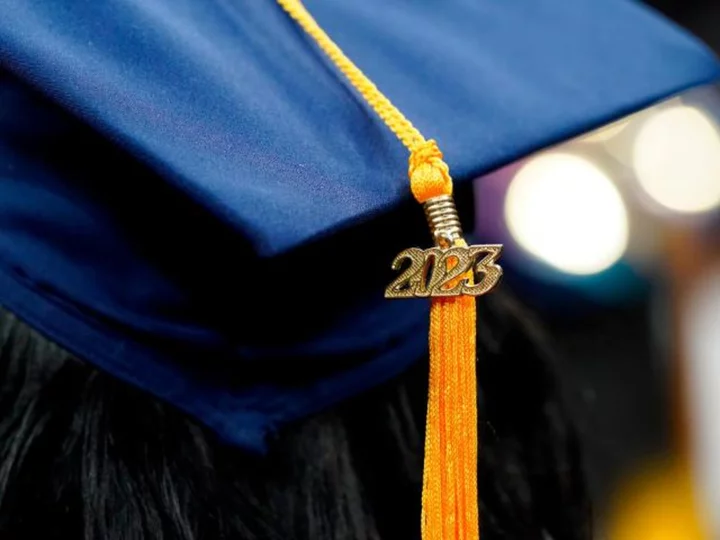
Student loan payments will be due starting in October, Department of Education clarifies
In October, tens of millions of borrowers will be required to pay their monthly federal student loan bills for the first time since March 2020, the Department of Education clarified Monday.
2023-06-13 02:51
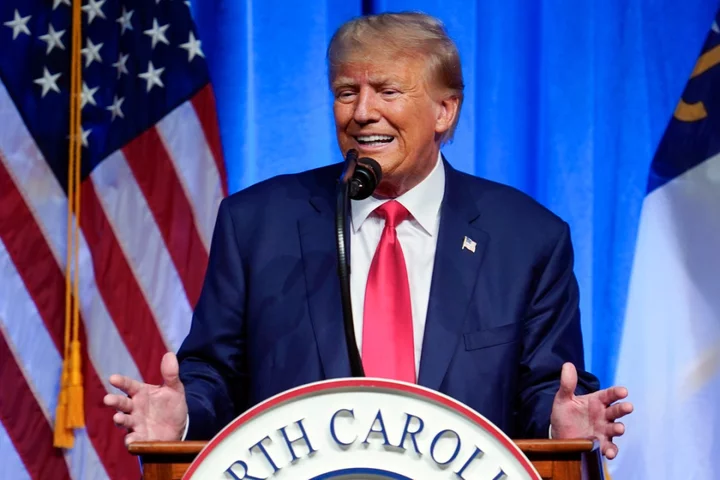
Trump vows to ‘go after’ Biden’s family in bitter Truth Social rant before boarding Miami arraignment jet
A vengeful Donald Trump swore that he’d get even with Joe Biden on Monday as he boarded a private jet to Miami where he is set to face his second criminal indictment this year. The ex-president ranted on Truth Social that he planned to use the power of the federal government, should he be elected to the presidency in 2024, to personally target Mr Biden’s family. “I WILL APPOINT A REAL SPECIAL “PROSECUTOR” TO GO AFTER THE MOST CORRUPT PRESIDENT IN THE HISTORY OF THE USA, JOE BIDEN, THE ENTIRE BIDEN CRIME FAMILY, & ALL OTHERS INVOLVED WITH THE DESTRUCTION OF OUR ELECTIONS, BORDERS, & COUNTRY ITSELF!” fumed Mr Trump in an all-caps rant posted around noon. It was a stunning declaration that throws the future of America’s justice system into question as such a move would wholly eliminate the independence and integrity of the Department of Justice, should he be successful. Mr Trump is set to be charged with 37 criminal counts related to his handling of presidential records in the wake of his departure from the White House in January 2021. More follows... Read More Ivanka and Jared split over attending Trump 2024 launch – follow live Why was Donald Trump impeached twice during his first term? Four big lies Trump told during his 2024 presidential announcement
2023-06-13 02:48
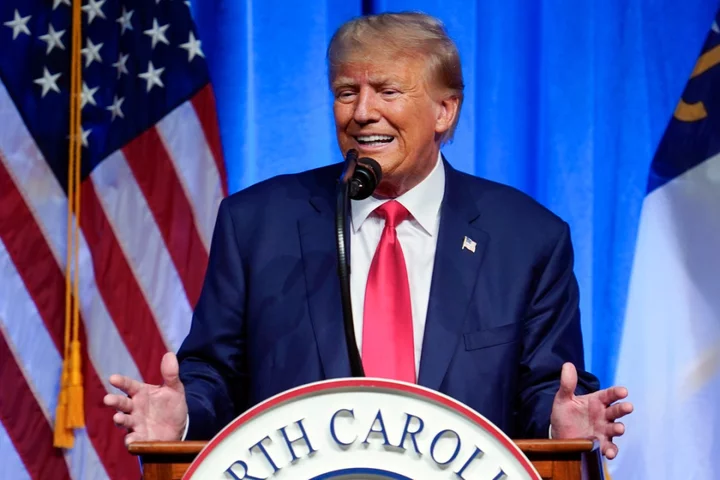
Trump struggles to find new defence counsel as Miami arraignment looms
Former president Donald Trump spent much of the day before his first appearance as a criminal defendant in federal court in search of experienced legal representation, but without much in the way of results. Mr Trump, who departed on Monday afternoon from the resort in Bedminster, New Jersey, where he primarily resides during the summer months to travel to Miami aboard his bespoke Boeing 757, has spent much of the last year and a half cycling through a rotating cast of criminal defence attorneys as he has contended with the Department of Justice probe that resulted in his unprecedented indictment under the Espionage Act last week. Two of the more experienced criminal defence lawyers in his stable, James Trusty and John Rowley, quit the ex-president’s team on Thursday, just hours after a Florida grand jury voted to charge him with 37 separate counts stemming from alleged violations of the Espionage Act and other portions of the US criminal code. Another lawyer, Timothy Parlatore, left Mr Trump’s employ roughly a month ago, citing conflicts with a longtime aide to the ex-president, Boris Epshteyn. Yet another of the criminal defence attorneys who once represented Mr Trump in the documents probe, Evan Corcoran, had to step away from that role in the wake of a court ruling ordering him to give evidence against the ex-president before a grand jury and turn over notes and recordings he’d made, citing a rarely-used exception to the attorney-client privilege used in case where an attorney’s advice is found to have been used to commit crimes. Mr Corcoran’s testimony and evidence figured heavily in the 39-page indictment against the ex-president, which detailed Mr Trump’s reaction after he was served with a subpoena compelling him to return all documents in his possession which bore classification markings. Now, with his arraignment just one day away, Mr Trump is scrambling to secure more experienced defence counsel to help him fend off charges which, if he is convicted, could theoretically land the 78-year-old ex-president in prison for the rest of his natural life. But although the Southern District of Florida is known to have a particularly strong defence bar, many of its most prominent practitioners are declining entreaties to join Mr Trump’s legal team. The Independent has learned that one well-known attorney, David Markus, has already declined to represent the ex-president. Mr Markus, a Harvard Law School graduate and former federal public defender, helped former Tallahassee mayor Andrew Gillum beat federal corruption charges earlier this year. While most lawyers would ordinarily jump at the chance to represent a former president of the United States, Mr Trump has long presented a challenge for those he’s asked to stand up for him in court. The ex-president is known to routinely disregard legal advice and is prone to making incriminating statements in public settings, two traits which have long dogged his attempts to find competent jurists to defend him in both civil and criminal matters, both during and after his presidency. Additionally, Mr Trump has a long history of refusing to pay for services rendered by skilled professionals, dating back to his days as a New York real estate developer. The involvement of Mr Epshteyn, a Georgetown Law School graduate who styles himself as Mr Trump’s in-house counsel despite the fact that he has never once appeared in any court on behalf of any client, has presented another stumbling block in the ex-president’s efforts to secure competent representation. According to sources familiar with the matter, Mr Epshteyn’s role in the ex-president’s orbit of late has been to coordinate the different teams of lawyers representing him in civil and criminal cases against him throughout the country. But some people who’ve been involved in those efforts say Mr Epshteyn has used his position to act as a gatekeeper and prevent Mr Trump’s lawyers from delivering candid advise or bad news, though spokespersons for Mr Trump have denied such claims and have described him as a valuable member of the ex-president’s team. As it stands now, Mr Trump is expected to be represented at his arraignment by Christopher Kise, a former Florida Solicitor General who joined the ex-president’s team in the wake of the 8 August 2022 search of his Palm Beach, Florida property by FBI agents, as well as Todd Blanche, a veteran New York-based criminal defence lawyer who has previously appeared for Mr Trump after a Manhattan grand jury indicted him for falsifying business records earlier this year. Mr Kise, a veteran Sunshine State practitioner who is licensed to appear in the Southern District of Florida — the venue where Mr Trump now faces charges — is not known as an experienced criminal defence attorney, as he was first brought on to handle Mr Trump’s failed effort to block the Department of Justice from using the evidence recovered during the search of his home and office. Though Mr Blanche is not licensed to practice by the Florida State Bar or the Southern District of Florida, he can appear for Mr Trump on Tuesday if an attorney licensed to practice in the district such as Mr Kise is willing to vouch for him. Read More Trump indictment – live: Trump leaves Bedminster ahead of Miami arraignment as Bill Barr calls him ‘toast’ Lindsey Graham is lying for Trump. And it shows the real issue with the Republican party Morning Joe host shouts down Republicans backing Trump to appease ‘weirdos and freaks’ Ivanka and Jared split over attending Trump 2024 launch – follow live Why was Donald Trump impeached twice during his first term? Four big lies Trump told during his 2024 presidential announcement
2023-06-13 00:57
